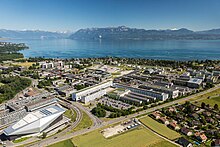
Back Bildungssystem in der Schweiz ALS التعليم في سويسرا Arabic Vzdělávací systém Švýcarska Czech Bildungssystem in der Schweiz German Sistema educativo de Suiza Spanish Système éducatif en Suisse French Ilimi a Switzerland Hausa Istruzione in Svizzera Italian Образование в Швейцарии Russian Utbildning i Schweiz Swedish


The education system in Switzerland is very diverse, because the constitution of Switzerland delegates the authority for the school system mainly to the cantons. The Swiss constitution sets the foundations, namely that primary school is obligatory for every child and is free in state schools and that the confederation can run or support universities.
The minimum age for primary school is about six years in all cantons but Obwalden, where it is five years and three months. After primary schools, the pupils split up according to their abilities and intentions of career paths. Roughly 25% of all students attend lower and upper secondary schools leading, normally after 12 school years in total to the federal recognized matura or an academic Baccalaureate which grants access to all universities.[citation needed] The other students split in two or more school-types, depending on the canton, differing in the balance between theoretical and practical education. It is obligatory for all children to attend school for at least 9 years.
The first university in Switzerland was founded in 1460 in Basel, with a faculty of medicine.[1] This place has a long tradition of chemical and medical research in Switzerland. In total, there are 12 Universities in Switzerland; ten of them are managed by the cantons, while two federal institutes of technology, ETH in Zürich and EPFL in Lausanne, are under the authority of the State Secretariat for Education, Research and Innovation.[2] In addition, there are seven regional associations of Universities for Applied Sciences (Fachhochschulen) which require vocational education and a special Berufsmatura, or a Fachmatura (a graduation by a Fachmittelschule) to study. Switzerland has a high rate of foreign students in tertiary education including one of the highest in the world of doctoral level students.[3]
Many Nobel prizes have been awarded to Swiss scientists. More recently Vladimir Prelog, Heinrich Rohrer, Richard Ernst, Edmond Fischer, Rolf Zinkernagel, Didier Queloz, Michel Mayor, Kurt Wüthrich, and Jacques Dubochet have received nobel prizes in the sciences. In total, 113 Nobel Prize winners stand in relation to Switzerland and the Nobel Peace Prize has been awarded nine times to organizations residing in Switzerland.[4][5] Geneva hosts the world's largest particle physics laboratory, the CERN.[6] Other important research centers are the Empa and Paul Scherrer Institute which belong to the ETH domain.
- ^ "Swissuniversity - University of Basel (UNIBAS)". Studyinginswitzerland.ch. Archived from the original on 8 March 2016. Retrieved 6 February 2016.
- ^ "swissuniversities". Crus.ch. Archived from the original on 9 October 2014. Retrieved 6 February 2016.
- ^ Education at a Glance 2015: OECD Indicators. Education at a Glance. OECD Publishing. 2015. doi:10.1787/eag-2015-en. ISBN 978-92-64-24208-1.
- ^ "Mueller Science - Schweizer Nobelpreisträger Nobelpreise Schweiz - Swiss Nobel Prizes - Nobel Prize Winners Switzerland". Muellerscience.com. Archived from the original on 24 February 2011. Retrieved 5 February 2016.
- ^ Goetz, Ulrich (7 September 2009). "Switzerland's Nobel boom – bust? - SWI". Swissinfo.ch. Archived from the original on 8 May 2014. Retrieved 6 February 2016.
- ^ "Home". Swissworld.org. Archived from the original on 29 April 2010. Retrieved 6 February 2016.
© MMXXIII Rich X Search. We shall prevail. All rights reserved. Rich X Search